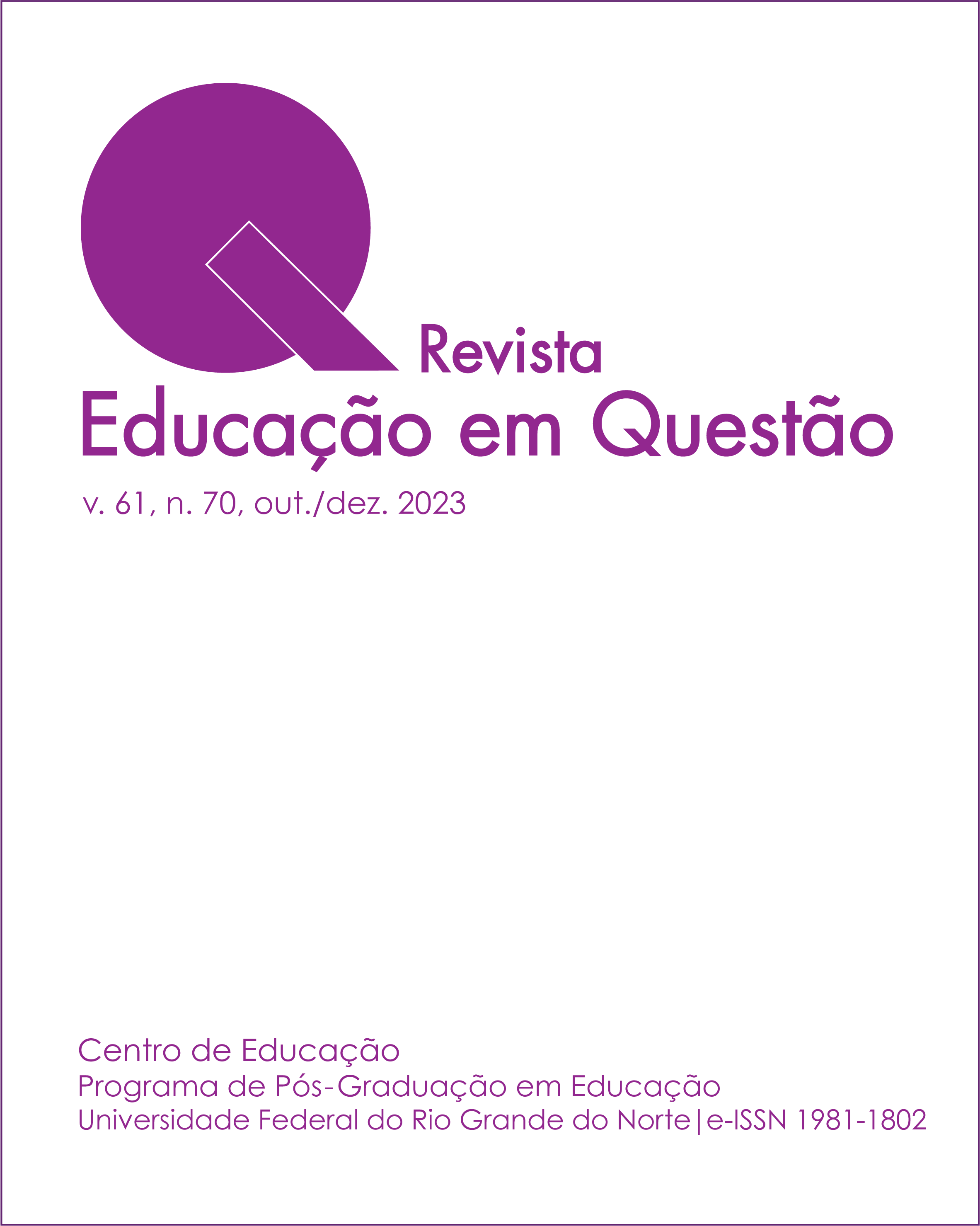Intercultural dialogue from an Erasmus Plus Project
student centered-learning
DOI:
https://doi.org/10.21680/1981-1802.2023v61n70ID34240Keywords:
Active learning, Intercultural studies, Erasmus Plus, UNESPAbstract
The article aims to discuss the possibilities of internationalization university actions with intercultural practices inferred from the implementation of an extension project at a public university in the state of São Paulo in the context of an Erasmus Plus Project. It is theoretically based on interculturality as dialogue and communication among different cultures, recognizing diversity as a value in itself, according to Dussel (2016), Quiroz (2007), Santos (2006), among others. The case study was the methodology adopted and the units of analysis are the pedagogical formation courses implemented with the theoretical-practical foundation of the Erasmus Plus Project in the extension action Cursinho Pré-Universitário Ferradura (College Prep Course Horseshoe), at São Paulo State University (UNESP). The results made it possible to systematize evidence of collaboration between different cultures. The conclusion is that projects such as Erasmus, even if proposed unilaterally, make it possible to establish internal dialogues within the university and, externally, with other university institutions, from the perspective that the “different” can promote synergies and intercultural dialogue.
Downloads
References
ANDRÉ, Marli Eliza Dalmazo Afonso de. Estudo de caso em pesquisa e avaliação educacional. Brasília: Liber Livro, 2005.
BARBIER, Renée. A pesquisa-ação. Brasília: Plano, 2002.
BERGMANN, Jonathan; SAMS, Aaron. Sala de aula invertida: uma metodologia ativa de aprendizagem. Rio de Janeiro: LTC, 2016.
BOURDIEU, Pierre. O poder simbólico. Rio de Janeiro: Bertrand Brasil, 1989.
BOURDIEU, Pierre. Poder, derecho y clases sociales. Bilbao: Editorial Desclée de Brouwer, 2000.
CANDAU, Vera Maria (org.). Educação intercultural e cotidiano escolar. Rio de Janeiro: 7 Letras, 2006.
CANDAU, Vera Maria (org.). Educação intercultural: documento de trabalho. Rio de Janeiro: GECEC-PUC-RJ, 2013.
CASTANHO, Sérgio; CASTANHO, Maria Eugênia de Lima e Montes. Temas e textos em metodologia do ensino superior. Campinas: Papirus, 2001.
CASTELLS, Manuel. A sociedade em rede. São Paulo: Paz e Terra, 2000.
CHESNAIS, François. A Mundialização do Capital. São Paulo, Xamã, 1996.
DEWEY, John. Como pensamos: como se relaciona o pensamento reflexivo com o processo educativo. São Paulo: Editora Nacional, 1959.
DEWEY, John. Democracia e educação: introdução à filosofia da educação. São Paulo: Editora Nacional, 1979.
FREIRE, Paulo. Pedagogia da indignação – cartas pedagógicas e outros escritos. São Paulo: Editora Unesp, 2000.
FREIRE, Paulo. Pedagogia do oprimido. 31. ed. Rio de Janeiro: Paz e Terra, 2001.
KENSKI, Vani Moreira. Educação e tecnologias: o novo ritmo da informação. DUSSEL, Enrique. Transmodernidad e interculturalidad. (Interpretación de la filosofía de la liberación). (UAM-IZ., México). Disponível em: https:// enriquedussel.com.txt/Textos_Articulos/347.2004_espa.pdf. Acesso em: 10 nov 2023.
LOJKINE, Jean. A revolução informacional. São Paulo: Cortez, 1995.
LÜDKE, Menga; ANDRÉ, Marli. Pesquisa em educação: abordagens qualitativas. São Paulo: Editora Pedagógica e Universitária, 2013.
MAZUR, Eric. Peer Instruction: a revolução da aprendizagem ativa. Porto Alegre: Penso, 2015.
MELLO, Alex Fiúza de; DIAS, Marco Antonio Rodrigues. Os reflexos de Bolonha e a América Latina: problemas e desafios. Educação & Sociedade, Campinas, v. 32, n. 115, p. 413-435, 2011.
MERSETH, Katherine. Cases and case methods in teacher education. In SIKULA, J. (org.). Handbook of research on teacher education. New York: MacMillan Publishing Company, 1996.
MORAN, José Manuel. Novas tecnologias e mediação pedagógica. Campinas: Papirus, 2000.
NEGROPONTE, Nicholas. A vida digital. São Paulo: Companhia das Letras, 1990.
PADILHA, Paulo Roberto. Planejamento dialógico: como construir o projeto político-pedagógico da escola. São Paulo: Cortez, 2001.
QUIROZ, Lopez-Hurtado. Trece claves para entender la interculturalidad en la educación latinoamericana. In: PRATS, Enric (org.). Multiculturalismo y educación para la equidad. Barcelona: Octaedro, 2007.
SANTOS, Boaventura Sousa. A gramática do tempo: para uma nova cultura política. São Paulo: Cortez, 2006.
SCHAFF, Adam. A sociedade informática. São Paulo: Brasiliense, 1995.
SIEBIGER, Ralf Hermes. Projeto ALFA/TUNING-América Latina: uma leitura a partir do cenário de sociedade e de necessidades sociais que o orientam. Revista Panorâmica, Cuiabá, v. 26, n. 2, p. 249-261, 2018.
SHULMAN, Lee; SHULMAN, Judith. Como e o que os professores aprendem: uma perspectiva em transformação. Cadernos Cenpec, São Paulo, v. 6, n. 1, p. 120-142, jan./jun. 2016.
SHULMAN, Lee. Case methods in teacher education. New York: Teacher College Press, 1992.
SYKES, Gare; BIRD, Tom. Teacher education and the case idea. Review of research in education, Washington, n. 18, p. 457-521, 1992.
VALENTE, José Armando. A Blended Learning e as mudanças no Ensino Superior: a proposta da sala invertida. Educar em Revista, Curitiba, n. 4, p. 79-97, 2014.
YIN, Roberto. Estudo de caso: planejamento e métodos. Porto Alegre: Bookmam, 2001.
WALSH, Catherine. Interculturalidade crítica e pedagogia decolonial: in-surgir, re-existir e re-viver. In: CANDAU, Vera Maria (org.). Educação intercultural na América Latina: entre concepções, tensões e propostas. Rio de Janeiro: 7 Letras, 2009.
WIGGINS, Grant; McTIGHE, Jay. Planejamento para a compreensão: alinhando currículo, avaliação e ensino por meio do planejamento reverso. Porto Alegre: Penso, 2019.
Downloads
Published
How to Cite
Issue
Section
License
Copyright (c) 2023 Journal Education in Question

This work is licensed under a Creative Commons Attribution-NonCommercial-ShareAlike 4.0 International License.
The Journal Education in Question shall retain the copyright in all articles that it publishes.
The authors and co-authors of articles and book reviews, published in the Journal Education in Question, shall wait for at least 1 (one) year before they are allowed to submit new works for publication.






